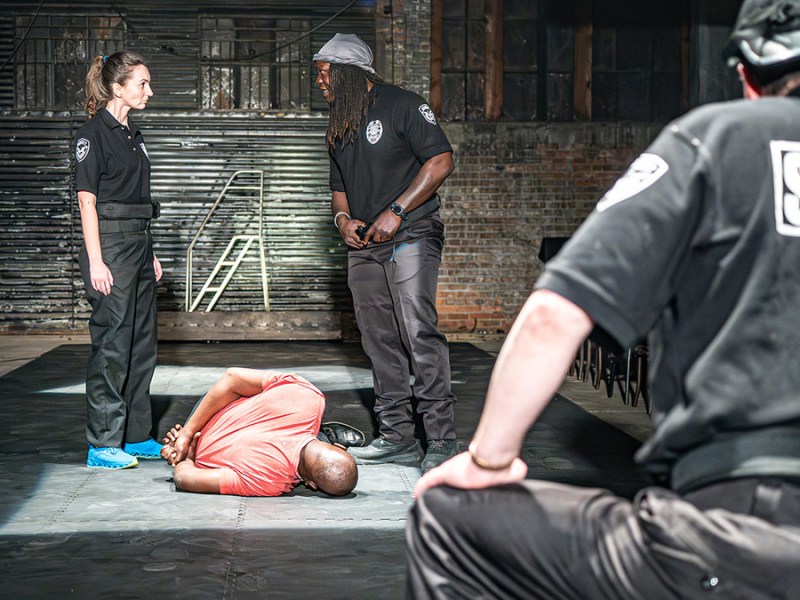Despite the title, Will Arbery’s 2018 play, Evanston Salt Costs Climbing, took a while to make it to the Chicago area. First Floor Theater’s local premiere, directed by Micah Figueroa, provides a rich buffet for a quartet of actors, and they dig into Arbery’s mix of existential dread—and the mundane distractions and joys we seek to avoid dealing with that dread—with heart and gusto, which helps override some of the more self-conscious elements in the story.
Evanston Salt Costs Climbing
Through 6/14: Thu–Sat 8 PM, Sun 3 PM; Den Theatre, 1331 N. Milwaukee, firstfloortheater.com, $10-$35
Basil (understudy Christopher Hainsworth at the performance I attended, filling in ably for Dano Duran) and Peter (Jelani West) are salt-truck drivers for the city of Evanston. It’s 2014, and the polar vortex is already wreaking havoc with the year’s salt budget, as local reporter Bill Agrigento writes about in the newspaper. Basil and Peter’s boss, Jane Maiworm (Ashley Neal), is delighted to be name-checked in the piece, as she’s only the assistant director of public works and is usually just referred to generically as “an official.” But when she finds out that Agrigento killed himself shortly after the piece appeared (apparently the events aren’t related—or are they?), her professional pride is overcome by her ever-present anxiety.
Jane’s adult daughter, Jane Jr. (Jacinda Ratcliffe), has similarly been overcome with depression and dread since her dad died years earlier, and spends a lot of mental energy obsessing about how there’s “something under everything and it’s making us all want to die!” Meantime, Peter’s antipathy toward his marriage takes a dark turn, and Basil’s past in Greece (hinted at in the microfiction he creates, and embodied in a nightmare vision of a woman with a purple hat who may be a manifestation of death itself) add to the general clamminess of Arbery’s tale, which unfolds over three successive winters.
The quavering linchpin here is Neal’s Jane, who tries to draw inspiration and courage from another Jane: Jane Jacobs, the author of The Death and Life of Great American Cities, whose activism saved Greenwich Village from the ravages of urban development in the 1960s. Evanston’s Jane is torn between her environmental instincts—pushing for heated pavers that would take road salt and its deadly environmental consequences out of the equation—and her concern for saving Peter and Basil’s jobs. (She’s been having a yearslong affair with the latter.)
Arbery, whose 2020 Pulitzer finalist Heroes of the Fourth Turning explored the lives of small-town Catholic conservatives in the early days of the first Trump administration, has obvious affection for the characters in Evanston, even if he does tend to oversalt his dramatic dish with irony, non sequiturs, and Lovecraft-lite musings on the end of the world.
Figueroa’s staging makes the most of the small runway playing area (designed by Spencer Donovan) in the Den’s Bookspan space, with Peter and Basil’s office at one end and Jane’s home on the other—and a cold, dark stretch of road and piles of dirty snow between work and homelife. The space is kept chilly so the actors don’t overheat while wearing their winter gear, but their performances warm up Arbery’s musings with heart and a sad commitment to keep plowing through, despite the obvious calamities.









